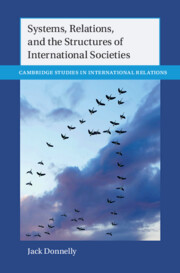Book contents
- Systems, Relations, and the Structures of International Societies
- Cambridge Studies in International Relations
- Systems, Relations, and the Structures of International Societies
- Copyright page
- Contents
- Figures
- Tables
- Acknowledgments
- Part I Systems, Relations, Levels, and Explanations
- 1 Systems and Relations
- 2 Complex Adaptive Systems
- 3 From Levels of Analysis to Levels of Organization
- 4 Systems, Causes, and Theory
- Part II Waltzian Structural Theory
- Part III Systems, Relations, and Processes
- References
- Index
- Cambridge Studies in International Relations
4 - Systems, Causes, and Theory
Explanatory Pluralism in IR
from Part I - Systems, Relations, Levels, and Explanations
Published online by Cambridge University Press: 19 October 2023
- Systems, Relations, and the Structures of International Societies
- Cambridge Studies in International Relations
- Systems, Relations, and the Structures of International Societies
- Copyright page
- Contents
- Figures
- Tables
- Acknowledgments
- Part I Systems, Relations, Levels, and Explanations
- 1 Systems and Relations
- 2 Complex Adaptive Systems
- 3 From Levels of Analysis to Levels of Organization
- 4 Systems, Causes, and Theory
- Part II Waltzian Structural Theory
- Part III Systems, Relations, and Processes
- References
- Index
- Cambridge Studies in International Relations
Summary
Multilevel multicomponent complex adaptive systems are not reducible to the sum of the causal effects of independent variables. Causal inference, which has a privileged place in contemporary IR (and many other social sciences) cannot address systems effects, which arise from interdependent elements and operations (not the impact of independent variables on dependent variables). Systems effects explanations explain why by showing how. They identify mechanisms and processes of causation. They thus are able to establish causal efficacy; that is, show how processes produce – actually cause – outcomes (rather than merely identify some elements that are part of an unspecified causal process). Such an understanding leads us away from a “laws and theories” conception of science, which remains popular in Physics and Chemistry, towards a “models and mechanisms” understanding, which predominates in the life sciences (which, on their face, seem a much better model for the social sciences).
Information
- Type
- Chapter
- Information
- Publisher: Cambridge University PressPrint publication year: 2023
